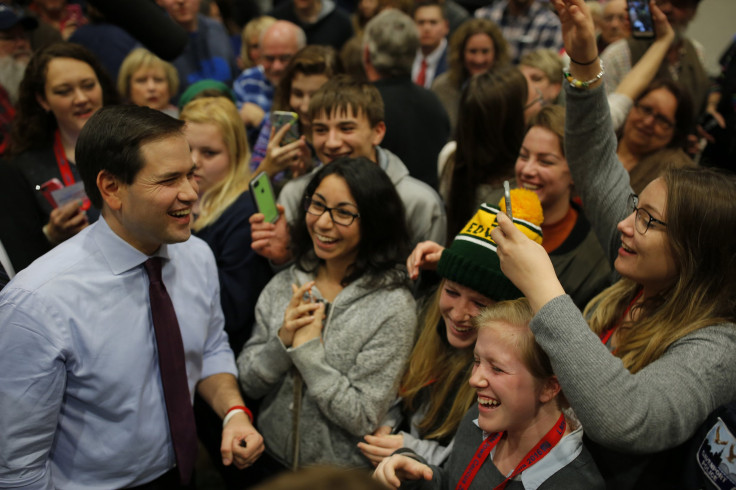When Will 2016 GOP Candidates Start Dropping Out? Iowa Caucus Could Push Bush, Kasich, Rubio Or Christie Along

Political pundits have been saying it for weeks, if not months: If any establishment Republican is to have a chance at beating businessman Donald Trump or Texas Sen. Ted Cruz, there will need to be a lot fewer of them in the field.
It’s generally assumed to be the strategy of the candidates vying for establishment support — chiefly Florida Sen. Marco Rubio, Ohio Gov. John Kasich, New Jersey Gov. Chris Christie and former Florida Gov. Jeb Bush — to survive and be the one left standing. The idea is pretty straightforward: Consolidate all of the support they are currently splitting, and one of them will have a chance at beating Trump. But when is that supposed to happen, and why hasn’t it happened yet?
Generally, the first few nominating states will force candidates to drop out of the race. Running a presidential campaign takes quite a bit of cash, and failing in early contests is generally a good indicator to donors that a candidate isn’t up to the task of mounting a serious campaign. Money tends to force people out of the race, alongside those poor performances themselves.
There are 12 Republicans competing in the 2016 Iowa caucuses, which isn’t actually that far off of the 10 who competed in 2012. Last time, many of the candidates stayed in the race for the next three nominating states – New Hampshire, followed by South Carolina and then Florida — but just four competed in the Nevada caucuses just a little over a month after Iowa.
But there was no phenomenon like Trump in the 2012 race, and there have been rumblings that the GOP establishment is already urging Republicans to coalesce around one candidate. Wisconsin Gov. Scott Walker, whose much-touted campaign didn't last through 2015, urged his fellow candidates to do just that when he exited in September. Now it appears that many in the establishment are quietly urging the candidates to back Rubio.
That said, candidates like Bush could be in the fight for a long time. While Bush is generally performing poorly in recent polls, he has the backing of a super PAC that has raised more than $103 million, mostly to spend on ads to bolster the former governor. Rubio, who has raised more than Bush for his official campaign committees, has super PACs with just $17.4 million in the bank, according to data provided by the Center for Responsive Politics.
Money and Iowa aside, New Hampshire could be a bigger kingmaker for the establishment Republicans hoping to secure the nomination.
Kasich, who was largely written off for much of the campaign season, is currently tied for a distant second place to Trump in the Granite State after a recent rise in polls, according to Real Clear Politics. Christie has shown life in the state, as well, but has since fallen to sixth place there. Bush currently comes in fifth, a little more than a point behind Cruz and Kasich. Rubio was just 0.8 percent behind Bush.
© Copyright IBTimes 2025. All rights reserved.






















